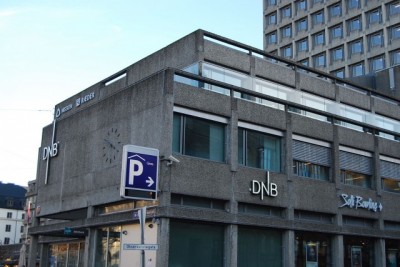DNB still ranks as Norway’s biggest and most profitable bank, but its standing among consumers, regulators and top politicians has taken a dive this year. From revelations of the use of tax havens leaked through the Panama Papers last spring, to reports last week that it will start charging customers to withdraw cash even from its own automated teller machines in Norway, the bank’s quest for profits is making it highly unpopular.

A recently released ranking of the reputations of Norwegian companies shows how DNB’s has sunk considerably this year. In 2013, the survey conducted by the Norwegian division of the French company Ipsos showed DNB in 23rd place, based on Norwegian consumers’ total impression of Norway’s largest companies. DNB’s ranking sunk to 44th place last year and to 60th place this year.
That marks one of the biggest year-to-year falls since the survey began 25 years ago, reported newspaper Aftenposten. Norway’s second-biggest bank, Nordea, took the next biggest dive, indicating how consumers in general, and perhaps their customers in particular, are dissatisfied.
It’s the ongoing cuts in bank services, branch closures and imposition of new and higher fees that irritate customers the most. DNB’s confirmation that it will start charging its customers NOK 10 (USD 1,25) every time they withdraw money from their own accounts at a DNB minibank (ATM) was not well-received. Customers will also get hit with a fee of NOK 20 if they withdraw cash at a post office or in a store, where they already get hit with fees for paying with a debit card. Newspaper Dagbladet editorialized last week how some Norwegian banks are in essence launching a campaign against cash, and want to make it more difficult to use cash despite the central bank’s insistence that it will remain legal tender.
Rough year rolls on
DNB’s poor showing in the most recent Ipsos survey confirms how it’s been a rough year for Norway’s biggest bank. In addition to the disclosure of DNB’s use of tax havens in the Panama Papers drama and the ever-higher fees charged to its customers, DNB has been blasted for closing branches, been accused of saddling customers in Lithuania with heavy debt instead of expected earnings on savings products and engaging in social dumping by hiring in technical experts from India who worked such long hours that Norwegian labour regulators launched an investigation. They uncovered several violations of state labour law at DNB, in which the state still holds a 34 percent ownership stake.
DNB was also found to have paid its female employees and executives “unreasonably” less than male employees in comparable jobs, it reported some “shocking” loan losses last summer and its entire board of directors and management have been under scrutiny since the Panama Papers revelations were made public and its “private banking” services were embarrassed. Monica Mæland, Norway’s government minister in charge of business and trade, finally claimed early last month that she still had confidence in DNB’s board and wouldn’t sack the leader of DNB’s board, Anne Carine Tanum. Both Tanum and DNB’s chief executive Rune Bjerke claimed they had no knowledge of how DNB’s private banking operations in Luxembourg had referred customers to tax havens in the Seychelles.
Mæland called the case “serious” and noted that the board had overall responsibility for what had been uncovered, but said she was glad the tax haven activity had at least been uncovered and halted. The Parliament’s disciplinary committee, however, has already indicated that it doesn’t share Mæland’s satisfaction with how DNB has responded. It may still call both Mæland and DNB’s board leader in for more questioning. DNB’s CEO Bjerke has already indicated he has no intention of offering his resignation.
Cartel accusations and pipeline protests
Last week came more bad news for DNB, Nordea and other major banking entities in Norway. The European Free Trade Association’s surveillance authority ESA is launching an investigation into charges that Norway’s two biggest banks plus Finans Norge and BankID have engaged in a cartel regarding agreements on online payments. Their alleged cartel may have prevented other new services for electronic payments that are cheaper to use.
This week, DNB was catching more criticism for helping finance construction of a highly controversial oil pipeline in the US that’s due to run through Sioux nation lands without its approval and pose hazards to their drinking water. The pipeline is accused of threatening the Sioux’ human rights.
DNB has also reported a 26.2 percent decline in pretax profits for the third quarter but it remains solid with strong capitalization. Investors thus sent its stock up 3.9 percent when the third-quarter results were released on Friday, so the bank had some good news. DNB shares have risen 30 percent since the beginning of August, in part because oil prices rose and may be stabilizing, which in turn can be good for the economy of its key market.
newsinenglish.no/Nina Berglund

